So, it took me a few attempts, but I’m sure now I’ve found a good framework to use for fuelling and making it through sevens tournaments. Before I get to that, we need to address the reasons why under perform at each tournament.
While I am no nutritionist the eating and hydration guidelines below have worked well for me and the physical management recommendations, which are my strong point, have worked for me and many others I have either talked to or read up on.
1 Day Tournaments
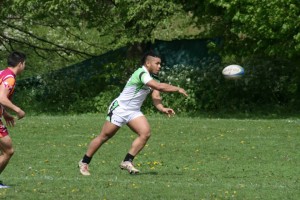 In international fifteens, players play with an almost 1:2 work rest ratio. Players cover almost 7000 meters in a game.
In international fifteens, players play with an almost 1:2 work rest ratio. Players cover almost 7000 meters in a game.
In sevens, the work rest ratio is 1:1 exactly and you cover on average just over 1500 meters per game!
On average, you will play 4 – 7 games a weekend meaning the minimum you run during a tournament is in the mid-6000s, and if you get past the group stages which you should be aiming to, you’ll going well over the mileage of your typical 15’s game!
The potential for fatigue in a sevens tournament is much larger than that of a full sided game. This means any costs for mistakes in your game day nutrition, recovery, or your routine leading up the that weekend will be much more costly than those you make leading up to a game of fifteens.
The biggest problems I see and have had myself are the following:
1. Inadequate Hydration;
2. Inadequate nutrition the days before and during the tournament;
3. Poor between game recovery methods;
4. Poor mental game; and
5. Resting far too long the week(s) of the tournament.
Hydration
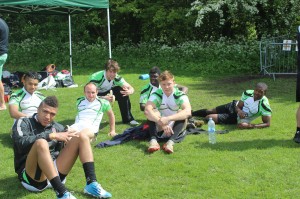 This weekend I had a fairly good performance in each game. I was tired but I could still go when I needed to and I didn’t seize up at any point.
This weekend I had a fairly good performance in each game. I was tired but I could still go when I needed to and I didn’t seize up at any point.
I think there are a few things responsible for it, but one addition made the world of difference – some inexpensive electrolyte tabs from myprotein.co.uk – two of them in a load of water sipped on and topped up between each game kept me going.
Compare that to last weekend where from game 2 onwards I had debilitating calf cramps that meant I was never going at full tilt. I could accelerate but I could never really gun in at top speed.
If you don’t hydrate properly your brain function suffers as well your ability to perform a lot of work under fatigue.
Add increased reaction times, cramping, inability to focus, and mental fatigue and you have a lot of things you have to overcome – just because you didn’t drink enough water!
Taking in some electrolytes in water will help your body take on water more effectively – not only that but the electrolytes will help with muscle contractions. Also, they are not just a prevention measure but a performance enhancer.
Nutrition Before & During
You’re going to need to fuel up a lot for a tournament.
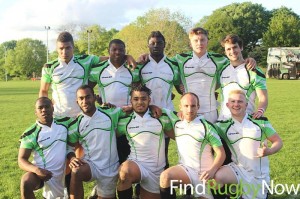 I’m not a huge fan of counting calories (although it does work very very well when done properly) so I do something simple.
I’m not a huge fan of counting calories (although it does work very very well when done properly) so I do something simple.
I eat a lot of food on the night TWO days before the tournament using a lot of meat, vegetables and easy digesting carbohydrates like oats, rice, spuds, and some other not so clean foods just to satisfy my cravings a bit.
The night before I top up a bit with ONE meal containing a lot of carbohydrates (probably adds up to 100-120 grams). This keeps me fuelled up usually for 3-5 full games before I begin to feel depleted. Once this happens I or someone else will have some simple sugars on hand such as wine gums jelly babies, lucozade, gatorade or something else similar. I find a handful or steadily sipping on this will suffice to keep you going until the end of the day.
Between Game Recovery
Most people will simply sit there messing around and doing a lot of nothing. As soon as you finish, try to stretch off, lie down and put your feet up for at least 10-20 minutes when possible. Napping if you have a long break is also a good idea. Even a 10-20 minute snooze is a great recovery accelerator.
Apart from the tips above for carbohydrate and water consumption, the other thing to do is to make sure you have some kind of protein on hand – be it beef jerky or some simple whey protein – make sure you have some to graze or sip on.
This not only helps with recovery for your games but it stops you feeling like you can’t walk properly for days after the tournaments finished, and if you plan on training hard and doing it all again next weekend, shaving off a half day of recovery time is crucial.
Poor Mental Game
FRN Coach Drew Fautley (ridiculously experienced sevens coach and former USA rugby 7s coach) told us something pretty important when we got to our final at Chiswick RFC. We were all spent and mentally burnt out and it was exactly what we needed to hear:
“It’s been a long day. I know you’re all tired, but you have to think about how much you want it, how much you want to win.”
As the day goes on you’re going to feel like shit on occasion, you will feel tired, your legs will feel heavy, you will slow as the day goes on. This isn’t the end of the world and, as matter of fact, it’s okay.
If you can convince yourself that it’s normal, then you won’t worry so much about the soreness or fatigue and you’ll just take it in your stride. All it takes is some joking around with teammates, some stretching or giving yourself a pep talk to get yourself to stop worrying about how bad you think you feel.
You also need to be able to throw a switch on in your mind when the game is about to start. You need to get your game-head on and then as soon as the game is finished you need to be able to quickly take in the good and be encouraged by it, think of the mistakes and know how to fix them in the next game, and then put everything out of your mind until the warm up for the next game. Mental fatigue is a bigger killer than physical fatigue.
Having 2-5 key phrases or words that to you represent an important part of your game can work. I use:
Strong (This brings up images of being strong over the ball at the breakdown, being able to win ball at the breakdown, break them and make them),
Quick (This makes me think of being able to weave in and out or evade defenders and track down guys without being beaten for speed), and
Aggressive and Relentless (both words remind me to be assertive and be that way throughout the whole game).
I repeat them over and over again in my head until I feel myself focusing on the game.
Resting Too Long the Week(s) Before
Although I see this more with guys I play with or against at the elite or invitational weekend (two-day) tournaments, it still bears saying here.
The England 7’s squad recently did a little feature in Rugby World Magazine where one of the forwards (I forget which one) said something like this ‘In the build up to the season, I’ll do a lot of jumping and quick lifts to build my strength and then the week or two out from the tournament I do plyometrics and a lot of sprints and ladders to bring my speed up a bit.’ He trains hard in the pre-season and before the tournaments he uses a few techniques to gives his speed and power the boost he wants prior to competing.
If you ever fall below 90% of your peak you have to workout a lot longer just to be in a trainable state. By staying at 90% a majority of the year as this player does, as soon as you need to gun it you can, and you can peak very, very quickly!
Train hard the week of the tournament with your hardest workouts at the start of the week. Thursday should be done with less volume, perhaps reducing the load or intensity and Friday is active recovery (brisk walking, swimming, foam rolling, nothing more) or even a compete day off!
References
1. McLean, D. A. (1992). Analysis of the physical demands of international rugby union. Journal of Sports Sciences, 10(3), 285-296.
2. Cunniffe, B., Proctor, W., Baker, J. S., & Davies, B. (2009). An evaluation of the physiological demands of elite rugby union using global positioning system tracking software. The Journal of Strength & Conditioning Research, 23(4), 1195-1203.
3. Suarez-Arrones, L. J., Nuñez, F. J., Portillo, J., & Mendez-Villanueva, A. (2012). Running demands and heart rate responses in men rugby sevens. The Journal of Strength & Conditioning Research, 26(11), 3155-3159.








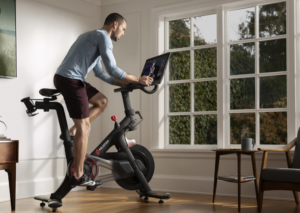 When most people hear the word “Peloton” they think of an expensive black bike with shiny red buttons and that controversial commercial where the husband gifted his wife a Peloton for Christmas.
When most people hear the word “Peloton” they think of an expensive black bike with shiny red buttons and that controversial commercial where the husband gifted his wife a Peloton for Christmas.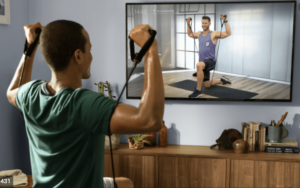 If the app interests you, Peloton is currently offering a 30 day FREE TRIAL, so why not give it a try? Check it out
If the app interests you, Peloton is currently offering a 30 day FREE TRIAL, so why not give it a try? Check it out 

 This article would not be complete, however, if we did not acknowledge some of the delivery issues that have been plaguing Peloton over the last year. Most of the delivery issues seem to affect U.S. deliveries, however, the UK deliveries have been affected as well.
This article would not be complete, however, if we did not acknowledge some of the delivery issues that have been plaguing Peloton over the last year. Most of the delivery issues seem to affect U.S. deliveries, however, the UK deliveries have been affected as well.







